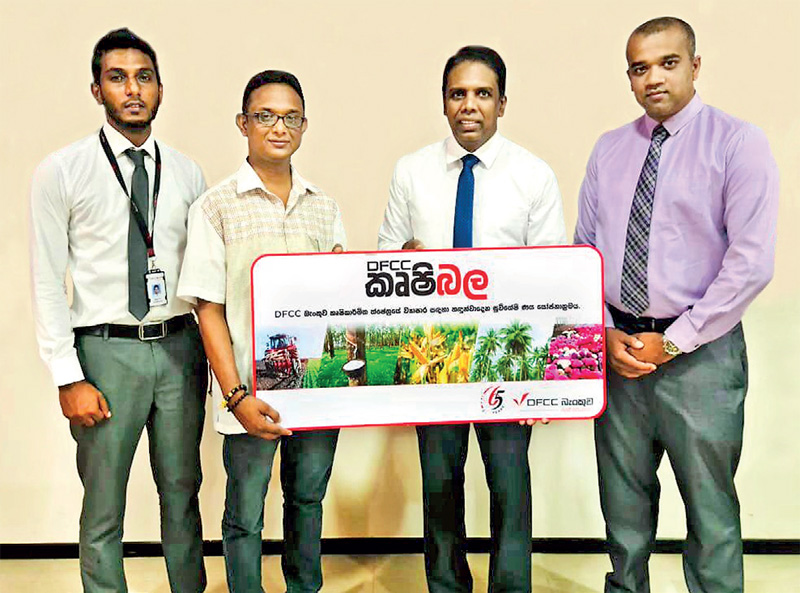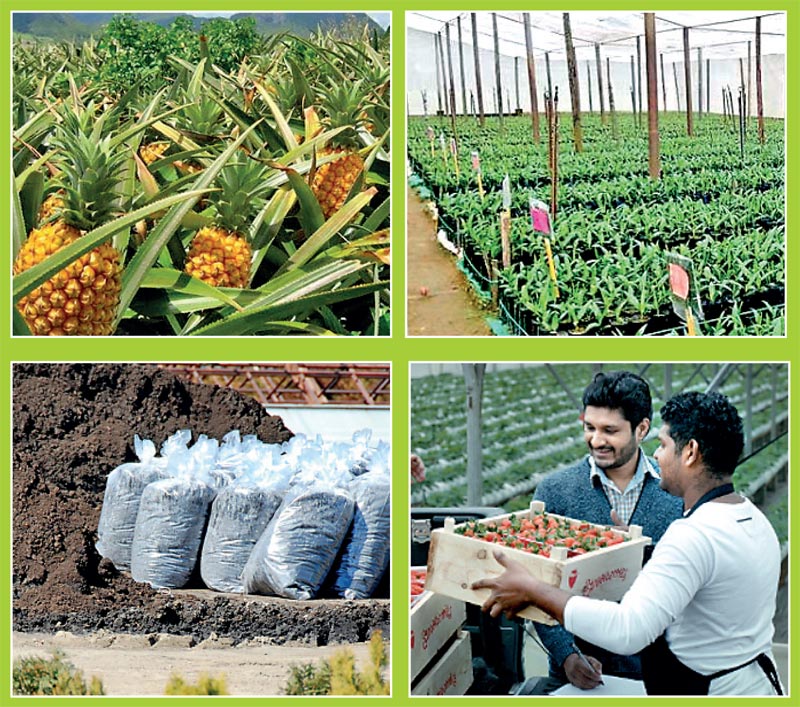Monday Feb 23, 2026
Monday Feb 23, 2026
Thursday, 15 July 2021 00:00 - - {{hitsCtrl.values.hits}}

The first ‘DFCC Krushibala’ loan was presented to Saman Udayakumara, an energetic entrepreneur from Wellawaya. From left: DFCC Bank Wellawaya Credit Officer Dinith Gunarathne, Proprietor Saman Udayakumara, DFCC Bank Vice President/Regional Manager Chandana Garusinghe, and DFCC Bank, Wellawaya Branch Manager Amila Denipitiya
|
DFCC Bank Senior Vice President, Branch Banking and SME Aasiri Iddamalgoda
|
With its roots as Sri Lanka’s pioneer specialised development bank with a heritage of 65 years, and now a fully-fledged commercial bank, DFCC Bank assured its commitment to continue to nurture and foster Small and Medium-sized Enterprises (SMEs) in particular to emerge back stronger from the COVID-19 pandemic infused economic slowdown, remaining true to the bank’s DNA.
The following article is an excerpt of an interview with DFCC Bank PLC Senior Vice President – Branch Banking and SME Aasiri Iddamalgoda, on the services offered by the bank to specifically cater to SMEs in the agriculture sector in Sri Lanka.
In its next step to advance economic development and fulfil its pledge to contributing to a resilient Sri Lanka, DFCC Bank announces the ‘DFCC Krushibala’ credit scheme, introduced exclusively to assist SMEs engaged in the local agricultural and related sectors.
Aasiri Iddamalgoda noted that the new ‘DFCC Krushibala’ credit scheme introduces loan facilities of up to Rs. 100 million, with repayment periods of five to seven years based on the type of loan, at a concessionary fixed interest rate of 7% per annum. The core objective of the scheme is to enable and empower SMEs in agriculture and related sectors and also build a strong platform through which they may work towards overcoming and rebounding from the difficulties faced due to the ongoing COVID-19 pandemic.
Loans under this scheme can be obtained for cultivation (tea/ rubber/coconut/floriculture/rotational crop cultivation/inter cropping), fisheries, livestock, dairy, agriculture processing (rice milling, grain legume processing, fruit and vegetable processing, dehydration, etc.), warehousing and enhancing storage facilities, development of commercial agriculture and hi-tech agriculture (control environmental agriculture/export agriculture crops, organic farming/nursery/seed production, drip irrigation, tissue culture, etc.) and introducing/capacity enhancement of organic fertiliser manufacturing.
The bank has committed to support the organic fertiliser manufacturing through this scheme at a historic time when the country is transforming towards organic farming. Therefore, the financial support to entrepreneurs and enterprises that are venturing out to meet the demand of organic fertiliser is crucial at this juncture.
The bank has also paid attention to the fact that whilst gender equity has been achieved in terms of education, it is still lacking in terms of employment, entrepreneurship and ability to conduct business. As such, Iddamalgoda pointed out that DFCC Bank aims to assign preference to women-led businesses and those that involve the adequate participation of women, in terms of employment, the inclusion of women in positions of management and/or decision-making ability and looks at the number of beneficiaries related to each business, with the overarching goal of securing economic gender equity.
DFCC Bank firmly believes that it is of paramount importance to introduce such concessionary financial schemes to uplift local industries to secure economic growth and financial stability. The lack of access to sources of capital, and severely restricted cash flows due to stagnant economic conditions have proved to be a significant hurdle in the path of economic development. Keeping this in mind, the credit scheme and fund allocation to the agricultural sector, which employs a significant percentage of the local population, and accounts a heavy portion of the local GDP, stands to have crucial, noteworthy, positive consequences for all stakeholders involved.
Among many other schemes and empowerment initiatives through which DFCC Bank has provided financial and technical support to farmers is a partnership with Market Oriented Dairy (MOD), funded by the US Department of Agriculture’s ‘Food for Progress’ program. Centred on the provision of customised lending facilities for dairy farmers, this initiative was implemented by the International Executive Service Corps (IESC), who managed technical support provision to both the dairy farmers, as well as all those directly involved in dairy sector-focused lending activities.
One prime example is a project that involved granting developmental loans to MSMEs within the farmer communities, strengthening their potential to earn, while securing and improving their livelihoods. Implemented in partnership with Chello Dairy Products Ltd., Chello involves the transfer of farmer loan payments directly to a DFCC Bank account in return of the farmers’ supply of milk. DFCC Bank in turn ensures access to readily-available financial support enabling them to have a stronger platform for carrying out dairy-farming activities.
The bank has further provided specialised loan conditions to ensure higher accessibility and applicability, including satisfactory pre-agreed risk ratings and reduced processing fees, giving the current difficult socio-economic conditions. The project strived to inculcate the habit of saving across the farmer communities, through a special cash build-up scheme involving the transfer of a small sum to farmer’s accounts, together with the loan instalment directly from the promoter company.
This falls in line with DFCC Bank’s efforts to provide support catering the ever-evolving requirements of SMEs in Sri Lanka. The products and services which provide solutions from term loans to leasing facilities, guarantee facilities and knowledge-building workshops, are all part of the long-term strategy to secure financial resilience amongst the priority sectors, while enhancing local entrepreneurial growth. On the digital sphere, DFCC Bank offers a range of products and services to its clientele including DFCC Virtual Wallet, DFCC iConnect, Virtual Account Opening, MTeller, DFCC Pay app, Premier Go, e-statements, SMS alerts and Internet banking. In particular, the DFCC MySpace self-banking solution which was launched in 2019 provides a hassle-free banking experience with the latest technological advancement of the sector.
Meanwhile Iddamalgoda highlighted the launch of the ‘DFCC Sahanaya’ concessionary loan scheme aimed at providing relief to SMEs in the export-related sector. Through this initiative, the bank disbursed loans and permanent working capital loans, providing immediate relief to export-related businesses. The loan scheme assisted exporters who failed to obtain low-cost funding under the Central Bank’s ‘Saubhagya COVID-19’ Credit Scheme due to limited availability.
The DFCC ‘Krushibala’ scheme is the next step in DFCC Bank’s journey to secure economic resiliency and sustainability and showcases the potential socio-economic benefits that will be brought about by the bank’s long-term approach and strategy.
